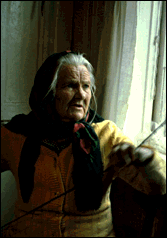That same autumn Elias Lönnrot wrote a manuscript entitled "The Songs of the Marrying Folk" based on the wedding songs he had collected. Lönnrot never had the work published, because he had made his decision to create an epic and wanted to include the wedding songs in it.
On his fifth field trip, Lönnrot spent just a single night (23 April 1834) in Voknavolok. As he wrote: "I went for a walk in the village the next morning and wrote down whatever songs I could.".
Lönnrot's visit to Voknavolok on his sixth field trip was also a brief one. During the second phase of his seventh journey, however, he spent four days in the village, collecting, in his words, "poems from quite a few people."
The number of poems Lönnrot recorded in Voknavolok does not compare with what the best bardic villages yielded. But the treasures he collected in the village - in addition to the wedding songs - included a lyric poem unique in being the only recorded folk poem to use the place name "Kalevala." Numerous variants of this poem, "The Maiden of Kalevala," which is found in Volume III of the Kanteletar (Poem 21), exist but only that recorded by Lönnrot in Voknavolok contains the word "Kalevala". It counts as one of Lönnrot's great strokes of genius to have given the epic and the land of its heroes this name, one which is easy to pronounce in every language and which connects them to their mythical ancestor, the folk-poetry figure Kaleva.





